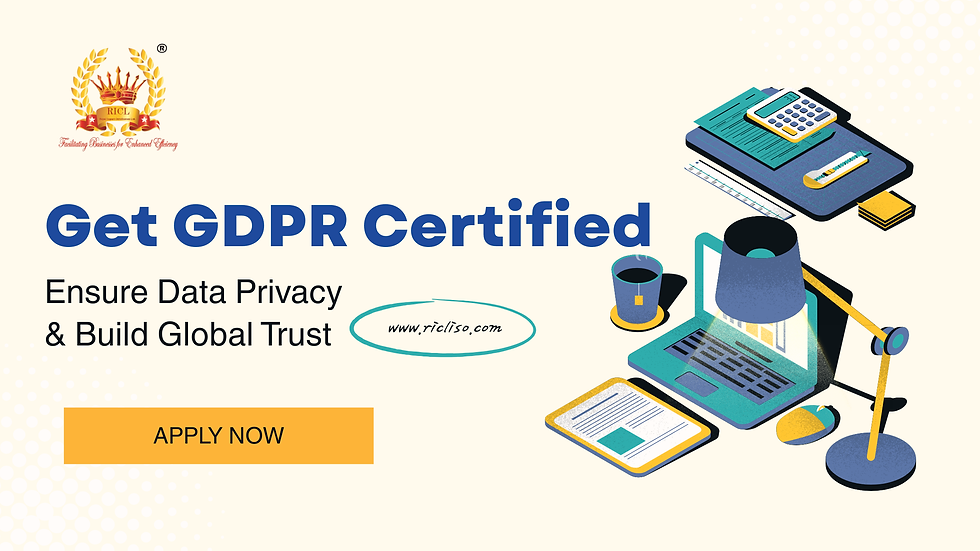How to Choose the Right ISO Certification Body in India
- teamitricl
- Jul 8, 2025
- 3 min read
Introduction
In today’s competitive landscape, getting ISO certified is more than just a badge—it’s a necessity. Whether you're running a small startup or a large enterprise, ISO certification lends credibility, assures quality, and opens the doors to new markets. But here’s the catch: choosing the right ISO certification body in India can make or break your journey. With dozens of agencies claiming to offer “genuine” certification, how do you find the one that’s actually legit? Let’s break it down.

1. Understand the Role of a Certification Body
Before anything else, you need to understand what an ISO certification body does. It’s not ISO (the organization) that certifies you. Instead, third-party certification bodies evaluate your business processes against ISO standards like ISO 9001 (quality), ISO 14001 (environment), or ISO 27001 (information security). These bodies conduct audits, verify compliance, and issue your ISO certificate.
Choosing the right body ensures international recognition, while the wrong one might leave you with a certificate no one trusts.
2. Check for Accreditation – Don’t Skip This!
This is the most important filter in your selection process.
Always ask: “Is your certification body accredited by a recognized authority like NABCB (India) or an IAF member?”
Accreditation is proof that the body itself has been evaluated and found competent. In India, the National Accreditation Board for Certification Bodies (NABCB) is the official body under the Quality Council of India. If the certifier isn’t accredited by NABCB or any international IAF MLA signatory, the certificate may not be accepted abroad or by clients.
Tip: Visit IAF’s official site or NABCB’s portal to verify if the body is listed.
3. Consider Their Experience and Specialization
Not all certification bodies are created equal. Some have rich experience in specific sectors like IT, manufacturing, education, or healthcare.
Here’s what to evaluate:
How long have they been operating?
Which industries do they specialize in?
What kind of clients have they worked with before?
A seasoned certification body can guide you better, conduct more meaningful audits, and help you improve—not just tick boxes.
4. Ask About the Audit Process
ISO certification is not just paperwork; it’s about real improvements. A credible certification body will conduct:
Stage 1 Audit (Document Review)
Stage 2 Audit (On-site Implementation Review)
Surveillance Audits (Annually)
Shady or non-accredited bodies might offer “fast-track” certification without any audit—this not only makes the certification invalid but also damages your company’s credibility.
Ask questions like:
How many auditors will visit?
How long is the audit?
What’s your audit methodology?
5. Evaluate Their Transparency and Support
Transparency is a green flag. Reliable certification bodies clearly explain:
Fee structure
Timelines
Required documentation
Post-certification support
Be cautious of agencies that quote unrealistically low prices or promise certification “without audit.” It’s a red flag for fraud or unaccredited certification.
Also, good bodies help you prepare for audits, guide you through non-conformities, and even share insights to help improve your management system.
6. Compare Costs—But Wisely
Everyone loves a good deal, but when it comes to ISO certification, you get what you pay for.
The cost depends on:
Type of ISO standard
Business size and complexity
Number of employees
Certification body’s reputation
While comparing quotes, don’t just look at the price tag—evaluate what’s included. A few thousand rupees saved upfront can cost you lakhs in lost credibility or re-certification later.
7. Read Reviews and Ask for References
What are others saying about the certification body?
Search for:
Google reviews
Client testimonials
Case studies on their website
Even better—ask the certifier for references of clients in your industry. If they hesitate, that’s your cue to walk away.
8. Check for International Recognition
If you’re planning to export or work with foreign clients, make sure your ISO certificate will be accepted overseas.
Certification bodies accredited by IAF-member accreditation boards (like NABCB) offer certificates that are recognized in over 100 countries.
If your certifier lacks international backing, your certificate might be just a fancy piece of paper abroad.
Conclusion
Choosing the right ISO certification body in India isn’t just a formality—it’s a decision that affects your brand’s credibility, operational efficiency, and growth potential. From checking accreditation and audit processes to evaluating transparency and industry experience, each step is crucial.
Don’t fall for shortcuts or “too-good-to-be-true” deals. Take your time, do your homework, and partner with a certifier who aligns with your goals and values.






Comments